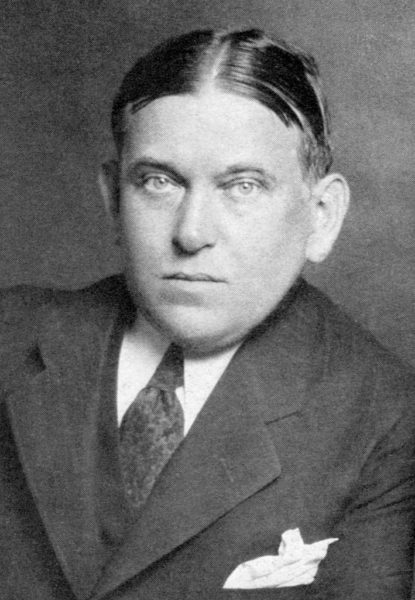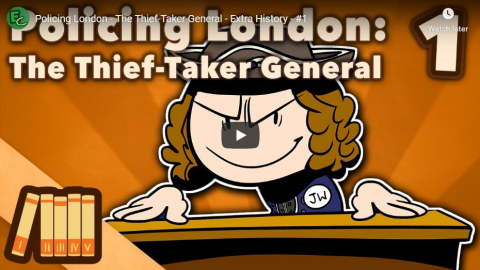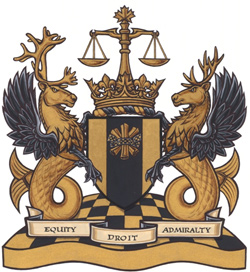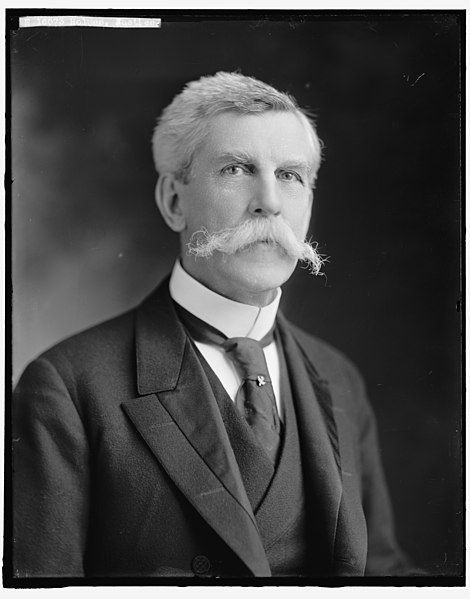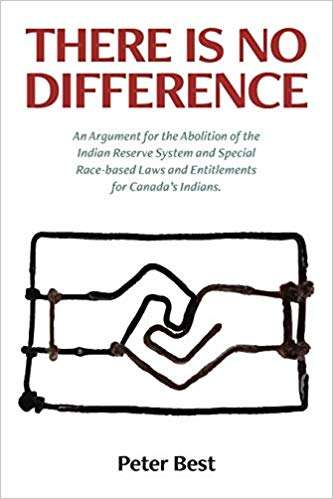Extra Credits
Published 7 Dec 2019Jonathan Wild had the whole crime system figured out. A man of justice by day, and leader of a criminal empire by night. But that is when Jack Sheppard came into his life. Jack Sheppard was a talented thief but an even more talented escape artist. And one of the last criminals in London who refused to bend the knee to Jonathan Wild. This was unacceptable. Jonathan Wild became obsessed. But obsessions can be dangerous. Every prison escape causes Sheppard’s popularity amongst the people, sick and tired of corruption, to grow. And the consequences may be deadly.
Join us on Patreon! http://bit.ly/EHPatreon
December 9, 2019
Policing London – The Fall of Jonathan Wild – Extra History – #2
December 8, 2019
The “Church of Atheism” doesn’t get charitable status … this time
Colby Cosh on the recent court decision on the Church of Atheism’s attempt to qualify as a church — and receive the tax benefits — under Revenue Canada’s rules:
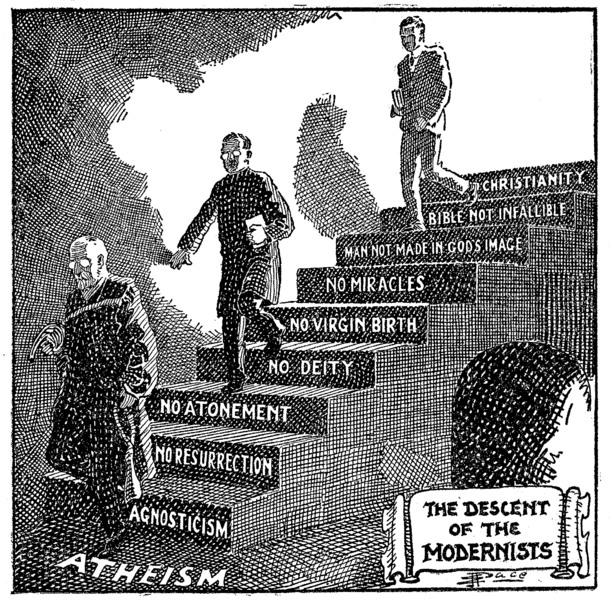
“The Descent of the Modernists”, by E.J. Pace, first appearing in his book Christian Cartoons, published in 1922.
Public domain via Wikimedia Commons.
Last week the Federal Court of Appeal upheld Revenue Canada’s rejection of an application for charitable status made by a “Church of Atheism” tucked away in Ontario’s Lanark Highlands. The idea of making a gesture like this has probably occurred to every atheist who looks around at a world of tax-exempt churches and wonders why his kind is excluded from the gravy train. (Clergymen pay tax on their income, but they have access to a generous residential deduction, and any professional expenses covered by the church go untaxed.)
The fact is that the “Church’s” efforts were a bit amateurish and confused. But they may, like a doomed military reconnaissance, have revealed weaknesses in the anomalous exclusion of atheists from religious tax exemptions.
These weaknesses cannot be any big secret. You probably remember the Supreme Court’s Mouvement laïque québécois v. Saguenay decision of 2015 — that’s the case in which the Quebec Court of Appeal had ruled that a statue of Christ with an electrically illuminated Sacred Heart was “devoid of religious connotation.” The Supreme Court, perhaps suppressing a chuckle or two, proceeded to unanimously overturn the Quebec ruling and expound the concept that the Canadian state has a Charter-based “duty of religious neutrality” (except, of course, where the constitution explicitly specifies otherwise, as with Catholic schools). Government, the SCC insisted, “must neither favour nor hinder any particular belief, and the same holds true for non-belief.”
Given that this is our law, what can be the problem with a “Church of Atheism”? Good question! Justice Marianne Rivoalen, writing on behalf of a three-judge Federal Court panel, confirmed the general point that there is a state duty of religious neutrality; in fact, even Revenue Canada, acting as the respondent, conceded this.
But the court simply ruled, without any logical elucidation, that “the Minister (of Revenue)’s refusal to register the appellant as a charitable organization does not interfere in a manner that is more than trivial or insubstantial with the appellant’s members’ ability to practise their atheistic beliefs. The appellant can continue to carry out its purpose and its activities without charitable registration.”
December 3, 2019
QotD: Defending freedom of speech
The trouble with fighting for human freedom is that one spends most of one’s time defending scoundrels. For it is against scoundrels that oppressive laws are first aimed, and oppression must be stopped at the beginning if it is to be stopped at all.
H.L. Mencken.
December 2, 2019
Policing London – The Thief-Taker General – Extra History – #1
Extra Credits
Published 30 Nov 2019These days we kind of assume that police are a normal part of law and order. But that wasn’t always the case. In fact, it wasn’t the case for a lot of human history. So how did we start thinking of police as a natural part of a city? It all starts in London with the Thief-Taker General Jonathan Wilde, a man of two faces. Which one is real: valiant crime fighter or the puppet master of London’s underbelly?
Join us on Patreon! http://bit.ly/EHPatreon
November 20, 2019
Activist court watch – Federal Court of Canada judge creates new website blocking rules
Michael Geist on the precedent-setting decision from the Federal Court of Canada:
A Federal Court of Canada judge issued a major website blocking decision late Friday, granting a request from Bell, Rogers, and Groupe TVA to block access to a series of GoldTV streaming websites. The order covers most of the Canada’s large ISPs: Bell, Eastlink, Cogeco, Distributel, Fido, Rogers, Sasktel, TekSavvy, Telus, and Videotron. The case is an important one, representing the first extensive website blocking order in Canada. It is also deeply flawed from both a policy and legal perspective, substituting the views of one judge over Parliament’s judgment and relying on a foreign copyright case that was rendered under markedly different legal rules than those found in Canada.
Perhaps most troubling is that the judge has created a substantive new policy framework for site blocking, an issue that given the many complex policy issues (including copyright enforcement, freedom of expression, net neutrality, and telecom competition) is best left to Parliament. Indeed, the activist judicial approach explicitly engages in an analysis that considers many of the policy issues but arrives at its own conclusion about how best to balance competing interests. These are issues that are best left to elected officials. The Standing Committee on Industry, Science and Economic Development, which completed the comprehensive copyright review earlier this year, heard extensive submissions from groups calling for reforms to the law to include site blocking. It instead recommended:
Following the review of the Telecommunications Act, that the Government of Canada consider evaluating tools to provide injunctive relief in a court of law for deliberate online copyright infringement and that paramount importance be given to net neutrality in dealing with impacts on the form and function of Internet in the application of copyright law.
In other words, the committee recommended holding off on a site blocking rule until further study is conducted. Moreover, it concluded that “paramount importance be given to net neutrality.” The judge in GoldTV acknowledged that there were net neutrality concerns (rejecting claims that “net neutrality is of no application where a site blocking order is sought.”), but concluded that the net neutrality issues did not tip the balance against granting the injunction. Not only is that inconsistent with the copyright review emphasis of paramountcy for net neutrality, but it represents the judge making a policy choice best left to elected officials.
The CRTC, which rejected a proposal for an administrative site blocking system in the FairPlay case, also thought the issue was best left to the government. Its ruling specifically cited the copyright review and the review of the Broadcasting and Telecommunications Act as avenues to address the issue. In other words, the appropriate venue to consider site blocking was government, not an administrative agency.
QotD: Theorizing an American police state
With apologies to Margaret Atwood and a thousand other dystopian novelists, we do not have to theorize about what an American police state would look like, because we know what it looks like: the airport, that familiar totalitarian environment where Americans are disarmed, stripped of their privacy, divested of their freedom of speech, herded around like livestock, and bullied by bovine agents of “security” in a theatrical process that has an 85 percent failure rate because it isn’t designed as a security-screening protocol at all but as a jobs program for otherwise unemployable morons.
Kevin D. Williamson, “O’Rourke’s America”, National Review, 2019-10-16.
November 8, 2019
Don’t hold your breath waiting for the Feds to tackle Quebec’s ongoing repression against minorities
Chris Selley on the situation in Quebec, where first-class citizenship is only available to those who speak French and don’t expect their religious beliefs to be respected:
One of the fascinating things about Quebec politics is that it’s often impossible to predict which absurdities will become controversial and which will be accepted as reasonable. The province’s linguistic and more recently cultural debates operate in an atmosphere so divorced from normal reality that it’s impossible to know how any new idea or event might react to its unique and volatile mixture of gases.
The classic example is Pastagate: An inspector from the Office québécois de la langue française found an Italian restaurant’s menu was riddled with Italian — calamari, antipasti — and issued the appropriate cease-and-desist notice. At no point did anyone suggest he had misinterpreted the law. Despite universal scorn and worldwide mockery, at no point did anyone successfully explain why this inspector’s actions were obviously ultra vires, while the OQLF’s other insane diktats — say, forcing a bilingual community newspaper to segregate English-language and French-language content such that English-only advertising will never appear on the same page as a French-language article — were reasonable.
As a result, Quebec politics is like a festival of trial balloons. Most recently we saw languages minister Simon Jolin-Barrette float the idea of banning merchants from greeting customers with “bonjour-hi” — a Downtown Montreal-ism that turns language hawks crimson with rage — only to have Premier François Legault shoot it down a couple of days later amidst widespread ridicule.
By contrast, we’re supposed to think it’s totally reasonable that the National Assembly voted merely to request that merchants use state-sanctioned greetings. Unanimously. Twice.
Ban religious symbols for all civil servants, or only those “in a position of authority”? Which civil servants are “in a position of authority”? Should currently employed civil servants affected by Bill 21 be grandfathered in or not? You can poll all you like, but until any given idea goes through Quebec’s intense media ringer, no one knows how it’ll shake out. With fundamental rights at stake, the majoritarian randomness of it all is truly alarming.
October 29, 2019
QotD: The financial crisis of 33AD
Let us next take a brief but important notice in Tacitus, for the year 33 AD:
Meanwhile a powerful host of accusers fell with sudden fury on the class which systematically increased its wealth by usury in defiance of a law passed by Caesar the Dictator defining the terms of lending money and of holding estates in Italy, a law long obsolete because the public good is sacrificed to private interest. The curse of usury was indeed of old standing in Rome and a most frequent cause of sedition and discord, and it was therefore repressed even in the early days of a less corrupt morality. First, the Twelve Tables prohibited any one from exacting more than 10 per cent., when, previously, the rate had depended on the caprice of the wealthy. Subsequently, by a bill brought in by the tribunes, interest was reduced to half that amount, and finally compound interest was wholly forbidden. A check too was put by several enactments of the people on evasions which, though continually put down, still, through strange artifices, reappeared. On this occasion, however, Gracchus, the praetor, to whose jurisdiction the inquiry had fallen, felt himself compelled by the number of persons endangered to refer the matter to the Senate. In their dismay the senators, not one of whom was free from similar guilt, threw themselves on the emperor’s indulgence. He yielded, and a year and six months were granted, within which every one was to settle his private accounts conformably to the requirements of the law.
Hence followed a scarcity of money, a great shock being given to all credit, the current coin too, in consequence of the conviction of so many persons and the sale of their property, being locked up in the imperial treasury or the public exchequer. To meet this, the Senate had directed that every creditor should have two-thirds of his capital secured on estates in Italy. Creditors however were suing for payment in full, and it was not respectable for persons when sued to break faith. So, at first, there were clamorous meetings and importunate entreaties; then noisy applications to the praetor’s court. And the very device intended as a remedy, the sale and purchase of estates, proved the contrary, as the usurers had hoarded up all their money for buying land. The facilities for selling were followed by a fall of prices, and the deeper a man was in debt, the more reluctantly did he part with his property, and many were utterly ruined. The destruction of private wealth precipitated the fall of rank and reputation, till at last the emperor interposed his aid by distributing throughout the banks a hundred million sesterces, and allowing freedom to borrow without interest for three years, provided the borrower gave security to the State in land to double the amount. Credit was thus restored, and gradually private lenders were found. The purchase too of estates was not carried out according to the letter of the Senate’s decree, rigour at the outset, as usual with such matters, becoming negligence in the end.
So far as we can understand what was happening, the passage largely explains itself. An old law restricting the rate of interest is suddenly revived. This invalidates a large class of loans above the official rate made on short term but renewable contracts. An indulgence is given of eighteen months, during which the now illegal loans are systematically called in. The result is a liquidity crisis in which land prices collapse. The crisis is dealt with by emergency lending by the Emperor.
There is nothing unusual about this sort of crisis. We are passing through something similar at the moment. What Tacitus is showing is a developed economy with much integration of capital and land markets. We can see how easily land can be sold, and how responsive prices are to the forces of demand and supply. Again, special pleading can be brought to bear on the story to try and minimise the extent of market behaviour. But, so far as this crisis can be analysed in terms of standard economic theory, the simplest explanation is to conclude that the economy of the early Roman Empire was, in its essentials, like that of the modern world.
Sean Gabb, “Market Behaviour in the Ancient World: An Overview of the Debate”, 2008-05.
October 27, 2019
Freedom of speech under threat (again)
In The Atlantic, Ken White strongly urges pro-free-speech advocates to avoid using some arguments that have been bandied around recently:
What speech should be protected by the First Amendment is open to debate. Americans can, and should, argue about what the law ought to be. That’s what free people do. But while we’re all entitled to our own opinions, we’re not entitled to our own facts, even in 2019. In fact, the First Amendment is broad, robust, aggressively and consistently protected by the Supreme Court, and not subject to the many exceptions and qualifications that commentators seek to graft upon it. The majority of contemptible, bigoted speech is protected.
If you’ve read op-eds about free speech in America, or listened to talking heads on the news, you’ve almost certainly encountered empty, misleading, or simply false tropes about the First Amendment. Those tired tropes are barriers to serious discussions about free speech. Any useful discussion of what the law should be must be informed by an accurate view of what the law is.
[…]“This speech isn’t protected, because you can’t shout ‘Fire!’ in a crowded theater.”
This line, though ubiquitous, is just another way to convey that “not all speech is protected by the First Amendment.” As an argument, it is just as useless.
But the phrase is not just empty. It’s also a historically ignorant way to convey the point. It dates back to a 1919 Supreme Court decision allowing the imprisonment of Charles Schenck for urging resistance to the draft in World War I. Justice Oliver Wendell Holmes Jr. wrote that the “most stringent protection of free speech would not protect a man in falsely shouting fire in a theatre and causing a panic.” This decision led to a series of cases broadly endorsing the government’s ability to suppress speech that questioned official policy. But for more than half a century Schenck has unequivocally and universally been acknowledged as bad law.
Holmes himself repented of the decision — though he continued to indulge his taste for pithy phrases with lines like “Three generations of imbeciles are enough” to justify forcible government sterilization of the handicapped.
So when you smugly drop “You can’t shout ‘Fire!’ in a crowded theater” in a First Amendment debate, you’re misquoting an empty rhetorical device uttered by a career totalitarian in a long-overturned case about jailing draft protesters. This is not persuasive or helpful.
October 3, 2019
Toronto’s gun problem
The city of Toronto has a gun problem, and politicians are lining up to offer variations of the same idea as the solution. You see, unlike every other city in North America, all of the gun crime in Toronto is committed by legal owners of AR-15 and AK-47 “assault weapons”. They’re all fully registered with the federal government, and have taken all the required training courses and keep their weapons under the strict storage and transportation rules, never taking them anywhere but to the legally designated shooting range and always on the permitted route to and from that range (and they’re all life-members of the NRA, of course). This is why, unlike every other city in North America, a ban on “assault weapons” will eliminate 100% of the gun-related crime in Toronto.
In the real-world version of Toronto, however, the proposed ban will have almost no impact on the crime rates, because almost none of the gun-related crimes committed in Toronto involves any kind of “assault weapon”, most being turf disputes involving illegal handguns between drug dealers and personal grudges among “young aspiring rappers who are just about to turn their lives around”:

Colt Canada’s model SA20, a commercial version of the Canadian C7A2 rifle.
Image from the Colt Canada website.
If Liberals are re-elected to a second term in government, their plan to tackle gun violence includes a ban on high-velocity, semi-automatic rifles like the AR-15, and gun marketing bans that evoke America’s favourite action figure.
“There are sometimes advertisements and videos that appear (on social media) … to imply that we can be GI Joe on our main street,” Public Safety Minister Ralph Goodale said about the Liberal platform’s vague reference to “limit the glorification of violence by changing the way firearms are advertised marketed and sold in Canada.”
During a Q&A with reporters in Ottawa on Sunday, where Goodale fielded questions about their incumbent government’s election promises, the minister attempted to qualify freedom of expression implications with the types of promotional material that could be targeted.
“(It) depicts a kind of behaviour that is simply inappropriate and some people would find it quite threatening … and it leads to the impression of military assault weapons is something you just do, every day,” explained Goodale.
I’m not a big consumer of advertising, but I can’t recall the last time I saw any kind of ad for firearms in Canada that wasn’t in a gun magazine (and there are not many of those sold in typical corner stores). Scary black guns in Hollywood movie ads, sure … they’re everywhere … but that’s not in any way related to the advertising, sale, or use of guns in Canada.
September 27, 2019
England’s constitution before the shiny new Supreme Court was created
Peter Hitchins provides a thumbnail sketch of the state of play before the Supreme Court was added to British constitutional arrangements:
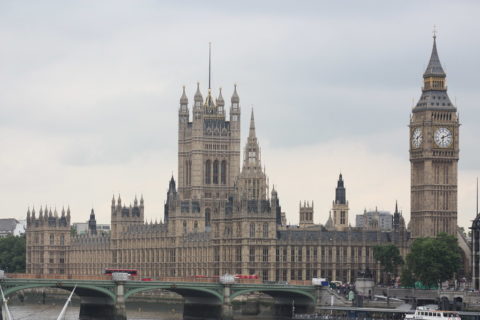
“Palace of Westminster” by michaelhenley is licensed under CC BY-NC-SA 2.0
Why did we never even have such a body until ten years ago? As we shall see, it would have been, and still is, a contradiction in terms. But in interesting times such as these, elephants fly, fishes walk, figs grow on thorns, and oxymorons inherit the earth.
The most powerful law court in the land was, by a curious paradox, not in the land at all, but based in tiny Luxembourg, across the Narrow Seas which have kept invaders from our door but are useless against bureaucratic takeovers by the European Union. There sits the European Court of Justice, which as long ago as 1990 established that it could tell British courts to overrule British Acts of Parliament when they conflict with E.U. law. It can carry on doing this until we eventually do leave the E.U., if we ever do.
These various messes came about because we are so old, and rely so much on convention and manners, that it is all too easy for unconventional and ill-mannered busybodies to come storming in with new ideas. England’s constitution was not planned and built, like America’s. Instead, it grew during a thousand years of freedom from invasion. Both are beautiful in their way. America’s fundamental law has the cold, orderly beauty of a classical temple. England’s has the warmer, more chaotic loveliness of an ancient forest. It seems to be wholly natural but, when examined closely, it shows many signs of careful cultivation and pruning. Our powers are not as separated as America’s, but slightly tangled. Still, it has worked well enough for us over time.
Any thinking person must admire both the American and the English constitutions as serious efforts in a world of chaos, despotism, and stupidity to apply human intelligence to the task of giving people ordered, peaceful, and free lives. They have a common origin in the miraculous Magna Carta, which Americans often revere more than modern Englishmen do. We in England have grown complacent about our liberty, and have become inclined to forget our great founding documents.
But the two constitutions are not the same, and in my view they are not compatible. For my whole life, until a few years ago, the very idea that England should have a Supreme Court was an absurdity. The Highest Court in England is the Crown in Parliament which, as I was once taught, had the power to do everything except turn a man into a woman. In these more gender-fluid times, that expression is not much used. But it contains the truth. Parliament can make any law and overturn any law, made by itself or by the courts.
That is why England (often to my regret) lacks a First Amendment and cannot have one unless we undergo a revolution. No law in England could possibly open with the words “Parliament shall make no law.” Our 1689 Bill of Rights, the model for the U.S. Bill of Rights a century later, tells the king what he cannot do and the courts what they cannot do. It grants me (as a Protestant) the right to have weapons for my defense. But while it draws its sword against arbitrary power, it puts a protective arm round Parliament.
September 20, 2019
QotD: Red Flag laws for politicians
You know what I’d like to see?
Red Flag laws for Congress.
Any Congresscritter says or does, something unConstitutional, anyone should be able to file a Red Flag violation and have that politician’s powers to write bills, attend sessions of Congress, vote, draw a taxpayer-funded paycheque, live in a mansion in Washington DC, or anything else tied to the job of being a Congresscritter immediately suspended.
There would be a hearing within fourteen days before a judge in their home district, where the Representative or Senator would be given the opportunity to show where in the Constitution what they said, or the law they proposed, or the action they did, was explicitly authorised, and if they can show that, their rights to all the goodies of being an elected representative of the People would be restored.
If they can’t, then they can sit at home for a year and twiddle their thumbs. Not allowed into the Capitol, no drawing a paycheque, no voting, no proposing bills, nothing added to their pension funds, zip, zero, NADA to do with being an elected official.
And their party doesn’t get to fill that slot. Their party doesn’t get to vote on their behalf. Their party doesn’t get to help them with re-election.
No, that Congresscritter, and the seat they occupy, goes into the penalty box for a year.
After a year, if their term in office hasn’t expired, they can take up their duties again.
Unless, and until, they mention violating the Constitution again, and someone files another Red Flag complaint.
Lawdog, “Sauce for the goose…”, The Lawdog Files, 2019-08-06.
September 19, 2019
“[T]he Indian Act is a benign form of apartheid”
In the National Post, Barbara Kay discusses a recent book on the key legislation that regulates relations between the Canadian federal government and the various First Nations groups:
Few and far between are disinterested scholars of Canada’s Aboriginal history who have the tough hide and principled will to publicly depart from the approved Indigenous “nation-to-nation” narrative that keeps the guilt and money flowing, but perpetuates a dysfunctional status quo on many reserves. Most of the dissenters are university academics. But Best is simply an intelligent man with a passion for his subject, a deep impatience with political correctness, and unremitting determination to weather whatever storms afflict him as he shepherds his views to a public market.
I’ve written before in the National Post and elsewhere about Best’s lonely battles with our society’s forces of repression. There Is No Difference began its public life as a post on a dedicated online site in 2014, copied to his legal firm’s. Shortly afterward, complaints were filed against him with the Law Society of Upper Canada (now the Law Society of Ontario), asking that Best be “disbarred or suspended” and that he be forced to apologize for using his law practice “to disseminate racist materials.”
After two years of stressful limbo, the Law Society graciously allowed that the excerpts submitted by the (unnamed) complainant were “not enough to merit a finding of any form of professional misconduct on their face.” (The last three words telegraph the ardent wish that they had been; apart from a dissenting group of new benchers, the Law Society’s board has increasingly demonstrated worrying Thought Police tendencies.)
Best believes the Indian Act is a benign form of apartheid, and advocates for the integration model of equal citizenship for all, a model promoted, for example, by Pierre Elliott Trudeau (who called the system “apartheid”), and the late Aboriginal lawyer William Wuttunee, author of Ruffled Feathers, who was marginalized and discredited as an “apple,” red on the outside, white on the inside.
Best believes the federal government must be the ultimate master in its own house for Canada to function as a healthy nation. He is fiercely critical of the Supreme Court’s 2004 emphasis on the “honour of the Crown” concept in its Haida Nation vs. British Columbia ruling, with key words “to consult and where appropriate, accommodate the Aboriginal interest” virtually decreeing a devolution of Crown sovereignty to Aboriginals, and effectively turning Indigenous bands into a third order of government with the power arbitrarily to advance or restrict Canada’s economic fortunes.
It’s easy for Indigenous activists to bash a white historian, or even an Aboriginal dissident without special standing like Wuttunee. But it will be more difficult to dismiss the opinion of a former Supreme Court justice. Best just came in for an unexpected stroke of luck. Former Supreme Court justice Jack Major (1992-2005) has given the book his endorsement in a letter discussed in an article by the Frontier Centre for Public Policy (FCPP).
September 18, 2019
The Canadian Charter of Rights and Freedoms* (*not all sections apply in Quebec)
Andrew Coyne on the disgraceful habit of the federal government (and nine provincial governments) to look the other way when Quebec decides that some of the guarantees in the Charter don’t apply in La Belle Province:
For many observant persons, particularly Muslims, Sikhs and orthodox Jews, this amounts to a religious hiring bar: the wearing of the hijab, the turban and the kippa are key requirements of their faith, and as such core elements of their identity. To demand that they work uncovered is, in effect, to post a sign saying Muslims, Sikhs and Jews need not apply.
We should be clear on this. It’s not just a dress code, or an infringement of religious freedom, or religious discrimination, or those other abstract phrases you hear tossed about. We are talking about a law barring employment in much of the public sector — not just police and judges, but government lawyers and teachers — to certain religious minorities.
Existing workers may have been grandfathered, but only so long as they remain in their current jobs. Should they ever move, or seek a promotion, they will face the same restrictions. The signal to the province’s religious and, let’s say it, racial minorities, vulnerable as they will be feeling already after the mounting public vitriol to which they have been exposed in the name of the endless “reasonable accommodation” debate, is unmistakable: you are not wanted here. Not surprisingly, many are getting out — out of the public service, out of Quebec.
That this is actually happening, in 2019, in a province of Canada — members of religious minorities being driven from their jobs, and for no reason other than their religion — is sickening, and shameful. That shame is not reserved to Premier Francois Legault or his CAQ government, the people responsible for designing and implementing this disgraceful exercise in segregation, this manifestly cruel attempt to cleanse the province’s schools and courts of religious minorities. It is no less shaming to the rest of us, everywhere across Canada, so long as we permit it to continue.
That is, so far as we are capable of feeling it. But experience has taught us to look the other way when it comes to Quebec, to tell ourselves that it is none of our affair, that we must not raise a fuss when the province explicitly elevates the interests of its ethnic and linguistic majority over those of its minorities, or threatens the country’s life for long years at a time — the beloved “knife at the throat” strategy — to back its escalating fiscal and constitutional demands. We dare not. We cannot. For then Quebec would leave.
September 17, 2019
“How did staging dinner-theatre raids to seize eleven grand’s worth of knock-off NFL merchandise become an ICE priority?”
Mark Steyn on a recent you’ve-got-to-be-kidding-me raid by ICE:
Because AOC and the open-borders left want to abolish ICE (US Immigration and Customs Enforcement), the right is obliged to defend it. This is a pity, because ICE is a deeply weird agency with, to put it mildly, increasingly curious and eccentric priorities.
Last week, for example, under crack agent Tatum King, ICE’s Homeland Security Investigations unit staged (that seems the appropriate word) a raid in Oakland of the Oakland Raiders game:
ICE targeted vendors of unauthorized T-shirts, hats, caps and bandannas. The agency said the raid was done in partnership with NFL brand security representatives and state and local law enforcement. The Oakland Police Department said it was not involved.
Officials said they seized about $11,000 worth of illegal swag — undoubtedly, most of it silver and black — during the ‘Monday Night Football’ game and its pre- and postgame tailgate parties.
Tatum King, special agent in charge of the San Francisco Homeland Security Investigations unit, said about 400 pieces of merchandise were seized but no one was arrested. NFL brand officials issued warning letters and may be pursuing civil action, he said.
As they should — and in small claims court, if eleven grand is the best a no-expense-spared federal-state-local raid with everyone in the full Robocop can come up with.
But what business is it of ICE’s “Homeland Security Investigations” division? This arrest-less “raid” and its attendant publicity ballyhoo undoubtedly cost US taxpayers more than the barely five figures’ worth of Oakland Raiders swag they’re now passing round the office.
Like ICE, HSI was created post-9/11 — to enforce four hundred laws “combating terrorism and enhancing national security”. How did staging dinner-theatre raids to seize eleven grand’s worth of knock-off NFL merchandise become an ICE priority? Which it undoubtedly is:
King said the agency is committed to ensuring the public purchases ‘legitimate products’ instead of cheaper knockoffs often sold outside stadiums like the Coliseum.
[…]
Tatum King appears to be the usual showboating tosspot in this regard. The picture above shows him after a previous raid netted him some Golden State Warriors merchandise. Agent King can’t keep actual MS-13 warriors out of the Golden State, but he can crack down on underpriced baseball caps and sweatshirts.
The President has declared, repeatedly, that there is an emergency at the southern border. I agree with that. He has also said that, therefore, he needs more resources. That’s harder to agree with when a rogue bureaucracy refuses to act as if there’s an emergency and deploy its existing resources accordingly.
In fact, I’m not sure the left’s alleged war on ICE isn’t just their usual sly deflection, intended to provide a bit of useful cover for a subversive immigration bureaucracy to carry on doing as it’s done for a generation now and refuse to enforce existing immigration law — at least for anything that matters.


